This long-running games convention started off as a Diplomacy
gathering. These days it's a blend of board-gaming and roleplaying.
With images;
cc-by-sa on
everything.
Friday
Not the best trip to Stockport I've had; it took a total of six hours
where it's usually doable in about four. (Red sections are below
50mph. Note that apart from the ends this trip is done entirely on
motorways.)
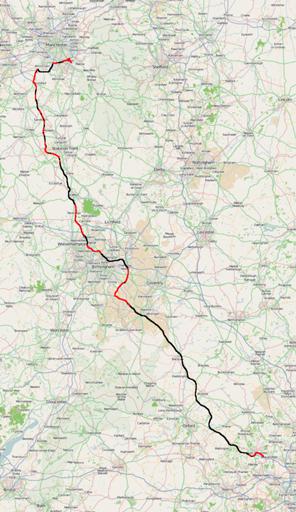
I spent most of this evening chatting and trying to cool off. Did get
in some Splendor, and a game new to me, Quartermaster
General.
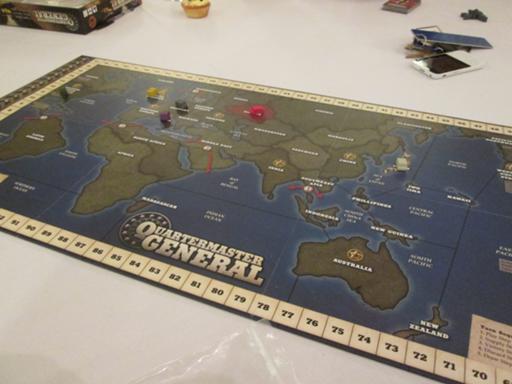
This is a quick-playing WWII game, basically about supply chains,
though it's dressed up a bit. The frustrating thing is that you're
limited in what you can do by your cards: you have seven in hand, and
you can discard as many as you like each turn, but once your deck is
exhausted you can basically take no actions for the rest of the game.
Each nation has its own deck, and since we had six players each had
one nation. (UK, USA, USSR, vs Germany, Italy and Japan; it's a team
game.)
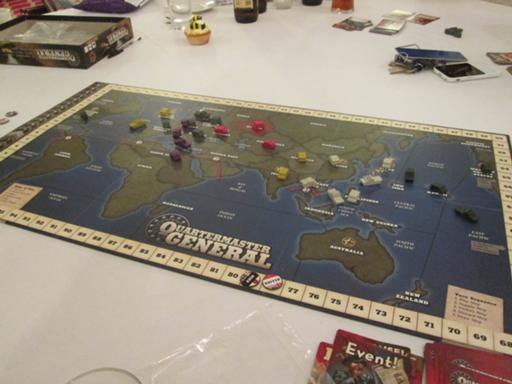
That said, the cards are interesting: apart from the obvious build and
attack actions, there are events which give some sort of special
one-off bonus (e.g. General Winter lets the Soviets destroy enemy
armies in specific locations). There are also Status cards, which
permanently change a rule for you (Shvernik's Evacuation Council
means that Soviet armies are never out of supply), though they can
occasionally be lost, and Response cards, which are played face-down
but which are triggered when specific events happen.
Unfortunately you can only play one card per turn, and there are only
twenty turns. So my early dreams of spreading across central Asia were
entirely unattainable.
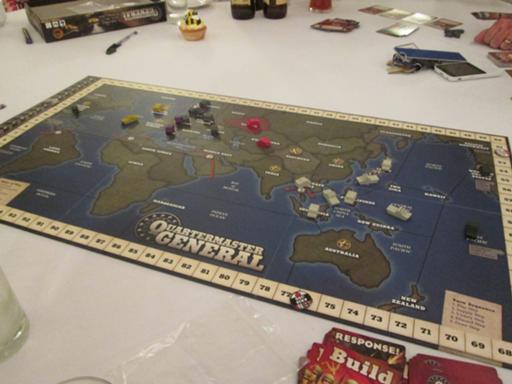
I found that as the Soviet Union I was able more or less to hold off
Germany – which was unfortunate, as I wanted to tempt them in and then
kill them off with General Winter. Japan and Italy ramped about all
over the place and built up a strong points lead, though not enough to win
the game.
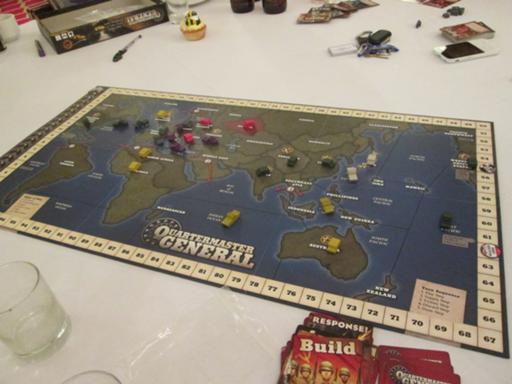
By the end the Allies had caught up with and overtaken the Axis, not
helped by Japan running out of cards (and the UK had too). I think I
was the weak partner, but an awful lot of it was luck of the draw.
Even so, I'm distinctly tempted to play this again.
Saturday
A present for the organisers (who have now put on fifty of these
things). (See the
25th anniversary celebratory box
given out in January.)
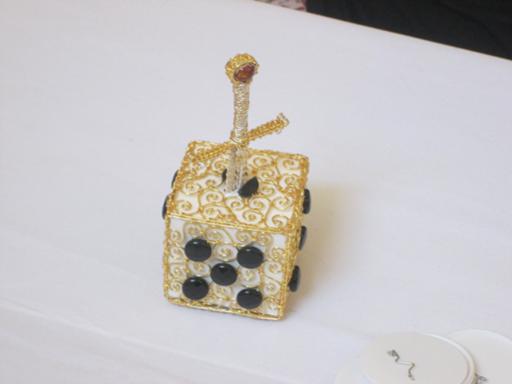
Chat in the morning and an RPG session in the afternoon, using the
Maschine Zeit
rules, intended for cinematic styles of play. I enjoyed the game but
felt that we didn't quite get into the spirit of the thing; our goals
weren't really all that incompatible, so we acted more like a normal
RPG party (which sticks together to fight the external threat) than
like the squabbling self-interested people we were probably meant to
be. (This wasn't helped by the weather being horribly hot; I had
trouble thinking on my feet, which like many indie systems this one
seems to require.) An interesting conceit, though, and I wouldn't mind
trying it again. Or stealing ideas; I've had vague plans for a horror
game set aboard the International Space Station for a while now.
Most of the players from that game went on to play
Tokaido, which
has been floating around for a while. You are a traveller along the
road from Kyoto to Edo; you can stop at various places along the way
to buy souvenirs, donate money to temples, bathe in hot springs, and
so on, and your goal is to have the most enjoyable experience overall.
Each character gets a different bonus rule, encouraging them to do
different activities.
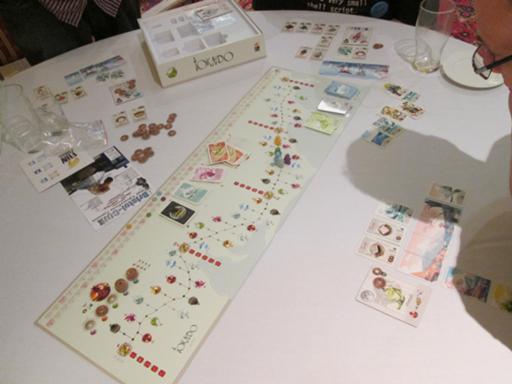
The main interaction is that the rearmost player moves first, and has
to move forward (as far as he likes), but can't stop on a spot where
another player already is. So we progressed more or less as a cluster,
occasionally skipping ahead one or two spaces to get to a particular sort
of place but generally without much in the way of gaps between us.
It's simple to learn (though the iconography is not ideal in poorish
light), but surprisingly complex. I definitely want to play this
again.
Sunday
I was wandering around after breakfast when I came across a game of
Firefly just getting started. I asked if they had
space, and they said yes if I already knew how to play. Er, yes, I
know how to play.
Ships and captains had already been chosen, but Nandi was still
available (as was Malcolm, oddly enough). The story card was not yet
revealed, but turned out to be Patience's War. (OK, Malcolm might have
been a better choice.)
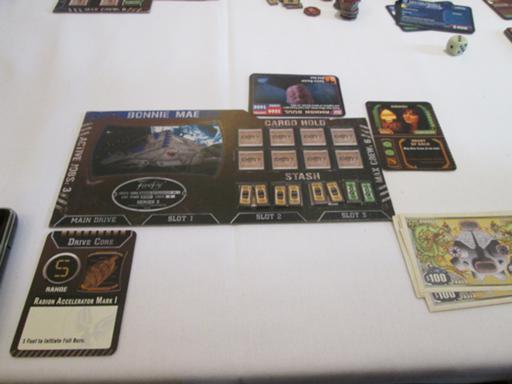
We soon dashed off in various directions, completing initial missions
to get reputations with the necessary contacts.
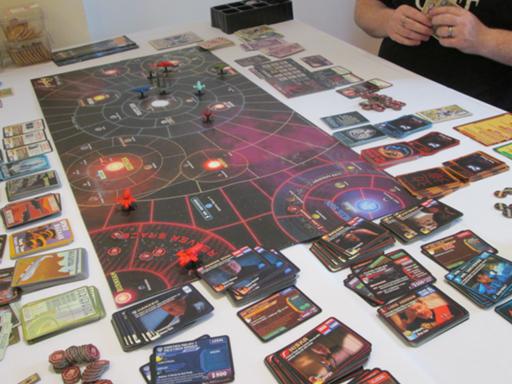
I gratuitously overused Nandi's ability to hire crew without charge
(don't ask). This meant I ended up paying $200 to complete a Harken
job, but it was worth it to avoid Customs Inspection.
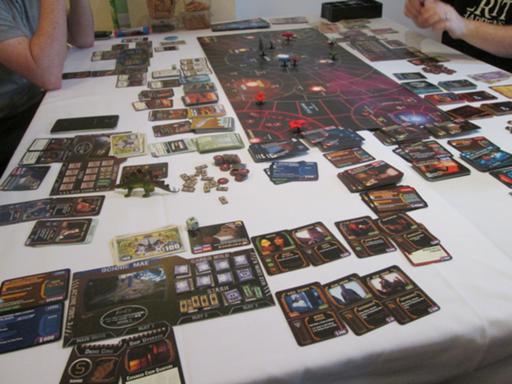
The Mr Universe job was a bit harder to arrange, but eventually I
managed to get things together.
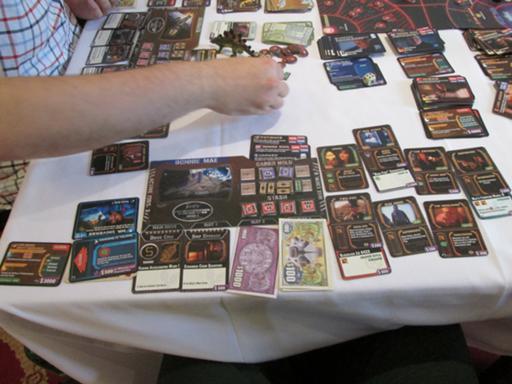
I quietly headed off for the first goal, with a bunch of expendable
fighters. A couple of other players also qualified, but needed to
build up their resources more before starting.
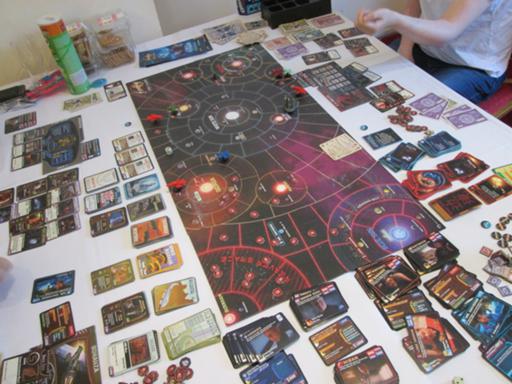
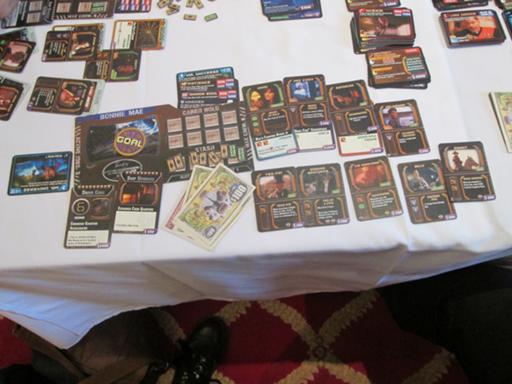
Towards the end I was building up ridiculous amounts of Contraband
(from salvage ops and misbehave cards), and stopped off to sell them,
which dealt with any money worries. Even with that, and another delay
to recruit more meat-shields, my first-goal lead of two or three turns
was enough to win me the game. (Not something that happens often.)
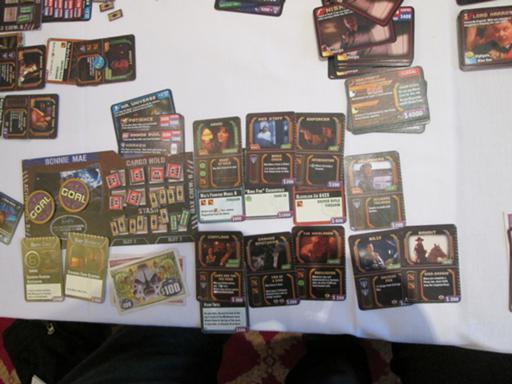
In play at another table:
Cthulhu Wars.
I think this is the second-biggest boardgame I have seen. (I own a
copy of OGRE Designer's Edition.)
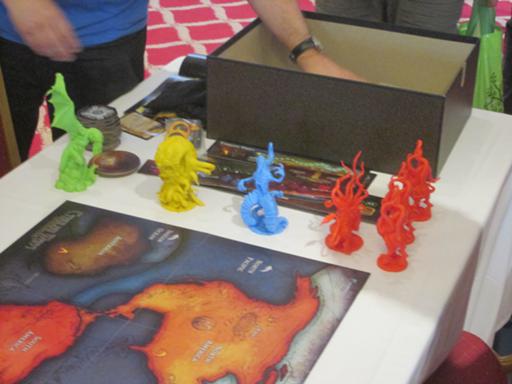
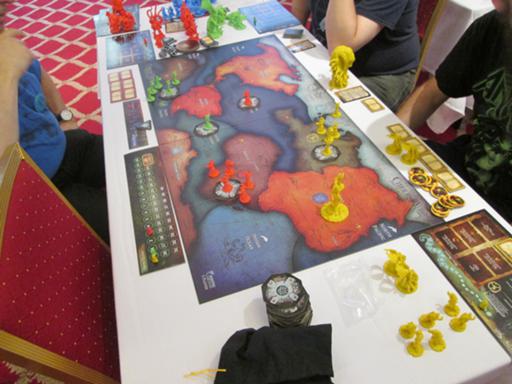
And so home again in around five and a half hours, with more jams and
roadworks on the M6 and an especially long segment just south of
Birmingham, waiting to get past a disintegrated caravan. (Why are
caravans even allowed? All they seem to do is cause trouble: they're
slow and unresponsive because they're towed by underpowered cars, they
have lousy visibility, their drivers don't seem to grasp the idea of
an articulated vehicle, they're supremely fragile… at least a
motor-home is built on a truck chassis and suspension that's designed
for that class of load. And you can't go anywhere with a caravan that
you couldn't go with a tent, which is probably warmer.)
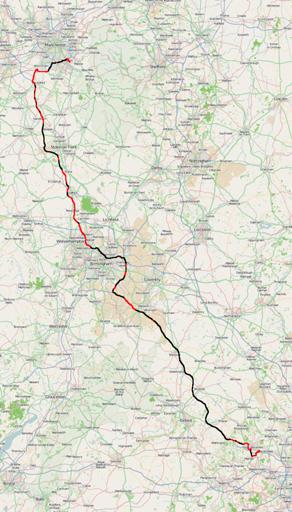
Comments on this post are now closed. If you have particular grounds for adding a late comment, comment on a more recent post quoting the URL of this one.